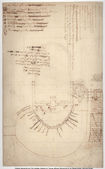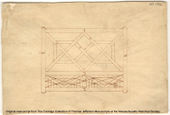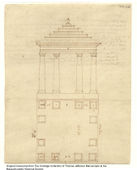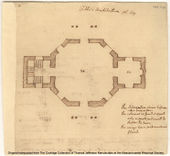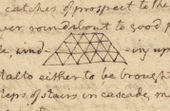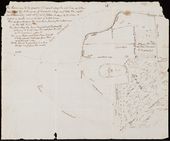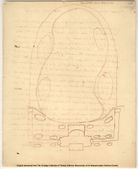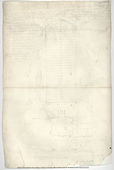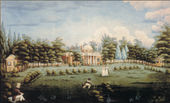Difference between revisions of "Monticello"
[http://www.nga.gov/content/ngaweb/research/casva/research-projects.html A Project of the National Gallery of Art, Center for Advanced Study in the Visual Arts ]
(→Texts) |
(→Texts) |
||
| Line 14: | Line 14: | ||
* [[Thomas Jefferson|Jefferson, Thomas]], July 31, 1806, in a letter from Washington to [[William Hamilton]]<ref>Jefferson Papers, [http://founders.archives.gov/documents/Jefferson/99-01-02-4111 ''Founders Online'', National Archives].</ref> | * [[Thomas Jefferson|Jefferson, Thomas]], July 31, 1806, in a letter from Washington to [[William Hamilton]]<ref>Jefferson Papers, [http://founders.archives.gov/documents/Jefferson/99-01-02-4111 ''Founders Online'', National Archives].</ref> | ||
| − | :"having decisively made up my mind for retirement at the end of my present term, my views & attentions are all turned homewards. I have hitherto been engaged in my buildings, which will be finished in the course of the present year. the improvement of my grounds has been reserved for my occupation on my return home. for this reason it is that I put off to the fall of the year, after next the collection of such curious trees as will bear our winters in the open air. the grounds which I destine to improve in the [[English style|style of the English]] | + | :"having decisively made up my mind for retirement at the end of my present term, my views & attentions are all turned homewards. I have hitherto been engaged in my buildings, which will be finished in the course of the present year. the improvement of my grounds has been reserved for my occupation on my return home. for this reason it is that I put off to the fall of the year, after next the collection of such curious trees as will bear our winters in the open air. the grounds which I destine to improve in the [[English style|style of the English gardens]] are chiefly in their native [[wood]]s not a bush scarcely having been suffered to be cut out of them. it is easier to take away what is superfluous than to supply a chasm. are in a form very difficult to be managed. they compose the Northern quadrant of a mountain for about ⅔ of it’s height, & then spread for the upper third over it’s whole crown. they contain about 300. acres, washed at the foot, for about a mile, by a river of the size of the [[Schuylkill River|Schuylkill]]. the hill is generally too steep for direct ascent, but we make level [[walk]]s successively along on it’s side, which in it’s upper part encircle the hill, & we intersect these again by others of easy ascent in various parts. they are chiefly still in their native [[wood]]s, which are majestic, and very generally, a close undergrowth, which I have not suffered to be touched, knowing how much easier it is to cut away, than to fill up. the upper third is chiefly open, but to the South is covered with a dense [[thicket]] of [. . . .] (Cerastium supparium Lin.) which being favorably spread before the sun will admit of adventageous arrangement for winter enjoyment. you are sensible that this disposition of ground takes from me the first beauty in gardening, the variety of hill & dale, & leaves me as an awkward substitute a few hanging hollows & ridges. this subject is so original unique & at the same time refractory that to make a disposn analogous to it’s character, would require much more of the genius of the landscape painter & gardener than I pretend to: I had once hoped to get Parkins to go & give me some outline. but I was disappointed. certainly I could never wish your health to be such as to render travelling necessary: but should a journey at anytime promise improvement to it, there is no one on which you would be recieved with more pleasure than at Monticello should I be there. you would have an opportunity of indulging on a new field some of the taste which has made [[the Woodlands]] the only rival I have known in America to what may be seen in England. thither we are to go without doubt, for the first models in this art. their sun-less climate has permitted them to adopt what is certainly a beauty of the very first order in landscape. their canvas is of open ground, variegated with [[clump]]s of trees distributed with taste. they need no more of [[wood]] than will serve to embrace a [[lawn]] or a glade. but under the beaming, constant & almost vertical sun of Virga, shade is our Elysium. in the absence of this no beauty of the eye can be enjoyed. this organ then must yield it’s gratificn to that of the other senses, without the hope of any equivalent to the beauty relinquished. the only substitute I have been able to imagine is this. let your ground be covered with trees of the loftiest stature. trim up their bodies as high as the constitution & form of the tree will bear, but so as that their tops shall still unite and yield a dense shade. a [[wood]], so open below, will have nearly the appearance of open grounds. then, where in open ground you would plant a [[clump]] of trees, place a [[thicket]] of shrubs presenting a hemisphere, the crown of which shall distinctly show itself under the branches of the trees. this may be effected by a due selection & arrangement of the shrubs, and will I think offer a groupe not much inferior to that of trees. the [[thicket]]s may be varied too by making some of them of evergreens, altgether. our red cedar made to grow in a bush, ever green Privet, Hyacanthus, Kalmia, Scotch broom, either separately or an[. . . .] are proper for this purpose, would be elegant; it will not grow in my part of the country. |
:"Of [[prospect]] I have a rich profusion and offering itself at every point of the compas, mountains distant & near, smooth & shaggy, single & in ridges, a little river hiding itself among the hills so as to shew in lagoons only, cultivated grounds, under the eye and two small villages. to prevent a satiety of this is the principal difficulty. it may be successively offered, & in separate different portions through [[vista]]s, or which will be better, between [[thicket]]s so disposed as to serve for [[vista]]s, with the advantage of shifting the scenes as you advance on your way. | :"Of [[prospect]] I have a rich profusion and offering itself at every point of the compas, mountains distant & near, smooth & shaggy, single & in ridges, a little river hiding itself among the hills so as to shew in lagoons only, cultivated grounds, under the eye and two small villages. to prevent a satiety of this is the principal difficulty. it may be successively offered, & in separate different portions through [[vista]]s, or which will be better, between [[thicket]]s so disposed as to serve for [[vista]]s, with the advantage of shifting the scenes as you advance on your way. | ||
:"You will be sensible by this time of the truth of my informan that my views are turned so steadfastly homeward that the subject runs away with me whenever I get on it. I sat down to thank you for kindnesses recieved, & to bespeak permission to ask further contribns from your collection, & I have written you a treatise on gardening generally, in which, art lessons would come with more justice from you to me." | :"You will be sensible by this time of the truth of my informan that my views are turned so steadfastly homeward that the subject runs away with me whenever I get on it. I sat down to thank you for kindnesses recieved, & to bespeak permission to ask further contribns from your collection, & I have written you a treatise on gardening generally, in which, art lessons would come with more justice from you to me." | ||
Revision as of 15:22, November 15, 2016
Overview
Site Dates:
Site Owner(s):
Site Designer(s):
Location:
History
Texts
- Jefferson, Thomas, July 31, 1806, in a letter from Washington to William Hamilton[1]
- "having decisively made up my mind for retirement at the end of my present term, my views & attentions are all turned homewards. I have hitherto been engaged in my buildings, which will be finished in the course of the present year. the improvement of my grounds has been reserved for my occupation on my return home. for this reason it is that I put off to the fall of the year, after next the collection of such curious trees as will bear our winters in the open air. the grounds which I destine to improve in the style of the English gardens are chiefly in their native woods not a bush scarcely having been suffered to be cut out of them. it is easier to take away what is superfluous than to supply a chasm. are in a form very difficult to be managed. they compose the Northern quadrant of a mountain for about ⅔ of it’s height, & then spread for the upper third over it’s whole crown. they contain about 300. acres, washed at the foot, for about a mile, by a river of the size of the Schuylkill. the hill is generally too steep for direct ascent, but we make level walks successively along on it’s side, which in it’s upper part encircle the hill, & we intersect these again by others of easy ascent in various parts. they are chiefly still in their native woods, which are majestic, and very generally, a close undergrowth, which I have not suffered to be touched, knowing how much easier it is to cut away, than to fill up. the upper third is chiefly open, but to the South is covered with a dense thicket of [. . . .] (Cerastium supparium Lin.) which being favorably spread before the sun will admit of adventageous arrangement for winter enjoyment. you are sensible that this disposition of ground takes from me the first beauty in gardening, the variety of hill & dale, & leaves me as an awkward substitute a few hanging hollows & ridges. this subject is so original unique & at the same time refractory that to make a disposn analogous to it’s character, would require much more of the genius of the landscape painter & gardener than I pretend to: I had once hoped to get Parkins to go & give me some outline. but I was disappointed. certainly I could never wish your health to be such as to render travelling necessary: but should a journey at anytime promise improvement to it, there is no one on which you would be recieved with more pleasure than at Monticello should I be there. you would have an opportunity of indulging on a new field some of the taste which has made the Woodlands the only rival I have known in America to what may be seen in England. thither we are to go without doubt, for the first models in this art. their sun-less climate has permitted them to adopt what is certainly a beauty of the very first order in landscape. their canvas is of open ground, variegated with clumps of trees distributed with taste. they need no more of wood than will serve to embrace a lawn or a glade. but under the beaming, constant & almost vertical sun of Virga, shade is our Elysium. in the absence of this no beauty of the eye can be enjoyed. this organ then must yield it’s gratificn to that of the other senses, without the hope of any equivalent to the beauty relinquished. the only substitute I have been able to imagine is this. let your ground be covered with trees of the loftiest stature. trim up their bodies as high as the constitution & form of the tree will bear, but so as that their tops shall still unite and yield a dense shade. a wood, so open below, will have nearly the appearance of open grounds. then, where in open ground you would plant a clump of trees, place a thicket of shrubs presenting a hemisphere, the crown of which shall distinctly show itself under the branches of the trees. this may be effected by a due selection & arrangement of the shrubs, and will I think offer a groupe not much inferior to that of trees. the thickets may be varied too by making some of them of evergreens, altgether. our red cedar made to grow in a bush, ever green Privet, Hyacanthus, Kalmia, Scotch broom, either separately or an[. . . .] are proper for this purpose, would be elegant; it will not grow in my part of the country.
- "Of prospect I have a rich profusion and offering itself at every point of the compas, mountains distant & near, smooth & shaggy, single & in ridges, a little river hiding itself among the hills so as to shew in lagoons only, cultivated grounds, under the eye and two small villages. to prevent a satiety of this is the principal difficulty. it may be successively offered, & in separate different portions through vistas, or which will be better, between thickets so disposed as to serve for vistas, with the advantage of shifting the scenes as you advance on your way.
- "You will be sensible by this time of the truth of my informan that my views are turned so steadfastly homeward that the subject runs away with me whenever I get on it. I sat down to thank you for kindnesses recieved, & to bespeak permission to ask further contribns from your collection, & I have written you a treatise on gardening generally, in which, art lessons would come with more justice from you to me."
Images
- 0824.jpg
1802
- 0899.jpg
1802
- 1288.jpg
References
Notes
- ↑ Jefferson Papers, Founders Online, National Archives.

